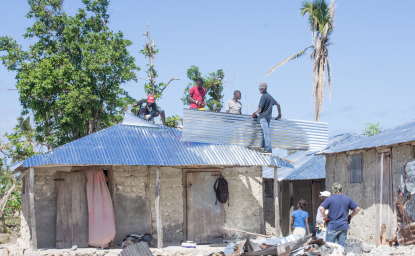Combating Climate Change with Condoms
The scientists and policymakers working to protect the planet may have overlooked one of the easiest, cheapest ways to reduce carbon emissions: contraception.
The scientists and policymakers working to protect the planet may have overlooked one of the easiest, cheapest ways to reduce carbon emissions: contraception.
Mountains of reports and studies have proposed expensive technological responses to climate change. But the scientists and policymakers working to protect the planet may have overlooked one of the easiest, cheapest ways to reduce carbon emissions: contraception.
A recent study estimates contraception would be almost five times cheaper than conventional green technologies. "Each $7 spent on basic family planning would reduce CO2 emissions by more than one ton," researchers conclude, while low-carbon technologies would add an extra $25 per ton.
Slowing population growth will not only cut emissions, but also help poor families in vulnerable areas adapt to the impacts of climate change, such as land degradation, drought, and disease. However, while governments of the poorest countries often cite population growth as a factor in environmental catastrophes, few address family planning as part of their adaptation strategies.
Helping women plan their families is not only climate-friendly, it's also right. Currently, more than 100 million women worldwide want—and can't get—modern methods of family planning. Better reproductive health care is a goal in itself.
While many policymakers have shied away from discussing population, Secretary of State Hillary Clinton recently said, "It's rather odd to talk about climate change and what we must do to stop and prevent the ill effects without talking about population and family planning."
As the world's largest per-capita emitter, the United States has a special obligation to examine its growth and consumption patterns. While the lives of Bangladesh's 140 million people are acutely threatened by climate change, each new U.S. child and its descendants will be responsible for 160 times the carbon emissions of a Bangladeshi infant, according to Oregon State University researchers.
Unfortunately, condoms are unlikely to become heroes at Copenhagen. Some populous developing countries like India object to bringing population into the climate change debate without more focus on reducing consumption in developed countries. Anti-contraceptive conservatives, development "silos," and old-fashioned squeamishness are also formidable barriers to an open and nuanced discussion of how family planning can contribute to mitigation and adaptation.
Too bad, because as Suzanne Petroni writes in the latest Environmental Change and Security Program Report, "A careful discussion of the ways in which voluntary family planning can further individual rights, community development, and, to some extent, climate change mitigation, could increase awareness not only of the out-sized contribution of developed nations to global emissions, but also of their appropriate role in the global community."

The Environmental Change and Security Program (ECSP) explores the connections between environmental change, health, and population dynamics and their links to conflict, human insecurity, and foreign policy. Read more



